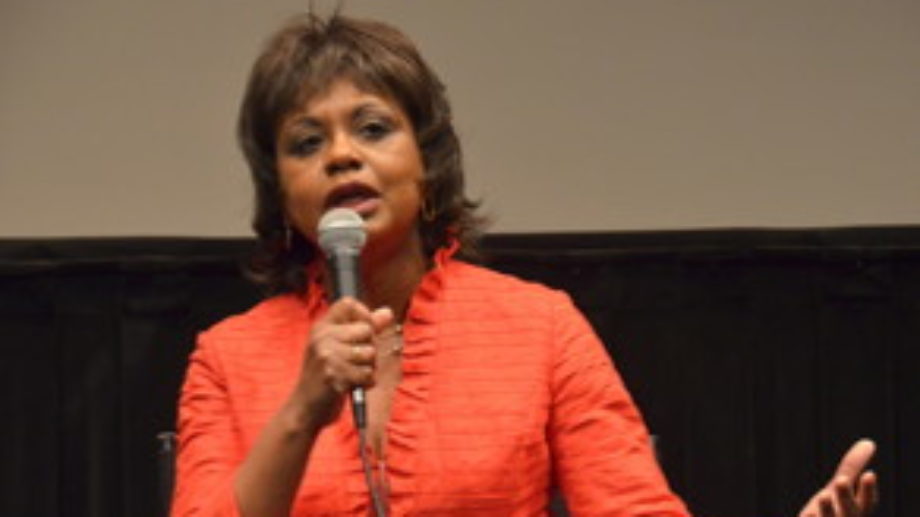
Anita Hill answers questions following a screening of Anita in the Human Rights Watch Film Festival. Photo: Godlis
For anyone in the U.S. in the early 90s, the name Anita Hill practically became a terminology unto itself. Even bigger than the individual, the name became synonymous with the stubbornly extensive yet hushed-up scourge of sexual harassment in the American workplace.
An attorney and academic, Hill was thrust to national and international prominence in 1991 when she alleged that then Supreme Court nominee Clarence Thomas had made harassing sexual statements when he was her superior at the U.S. Department of Education and the Equal Employment Opportunity Commission (EEOC). Though Thomas had only been a judge for just over a year, his character had been held up by President George H.W. Bush, who named him to succeed Thurgood Marshall on SCOTUS. Her private interview with the FBI and subsequent leak to the press re-opened hearings and Hill traveled to Washington, D.C. for hearings before the Senate Judiciary Committee. What followed turned into a media circus, with Hill asked to repeat sexual comments and innuendo allegedly said by Thomas. The spectacle called into question issues not only about sexual harassment but also race and gender.
Hill's experience is recounted in Anita, which opened the Human Rights Watch Film Festival on Friday. The doc's director Freida Lee Mock decided to reach out to Hill, who is now a professor at Brandeis University in Massachusetts, around the time of the 20th anniversary of the hearings.

Anita Hill and director Freida Lee Mock on stage at the Walter Reade Theater. Photo: Godlis
“I sent her my film, Maya Lin: A Strong Clear Vision and after a few weeks I heard back from her that she'd be interested to hear what I had in mind,” said Mock at the Walter Reade Theater. “I knew the 20th anniversary was coming up and I thought this would be an opportunity to ask: 'Who is she?' I also thought there were unresolved issues and it would be a great opportunity to bookend the personal story with the larger issue of sexual harassment.”
Hill also joined the premiere, taking to the stage at Film Society to comment on her desire to participate in the feature. “For me the motivation for doing the film was public and personal as well,” said Hill. “On the public side I was aware of a new generation that has grown up with a different relationship with the issue… There were books written about it. I had done one myself. But my family had not gone through the journey in the same way I have. So I thought if I had a film, I could present to my family and friends who were there the evolution of the issue. This, tonight, is an opportunity to show this to my family who were with me in 1991.”
When Hill first went to the hearings, she was instantly propelled into being a spokesperson on sexual harassment. She told the crowd at Film Society that she felt it was her duty to explain what had happened to the Committee, but what followed was a spectacle she never imagined.

Anita Hill in a scene from Anita.
“For me it was the integrity of the court,” said Hill. “I had relevant information for the Senate Judiciary Committee. We're talking about someone would would be put in the role of making decisions about law including sexual harassment, and he had put himself above those laws. It was the integrity of the court, and I think my friends and family knew that, but then sexual harassment became a public conversation. I thought at the time I'd speak on the topic for two years, but here I am 20 years later. Once I knew many women had experienced what I had, I couldn't raise it and then drop it. So here I am 22 years later… but we are making progress.”
The film delves into detail about the hearings and the subsequent fallout, which saw Thomas confirmed as a SCOTUS Justice and a partisan smear-campaign against Hill. Though she had made tenure at the University of Oklahoma, state lawmakers tried to pressure for her dismissal. She received thousands of letters both for and against her, as well as death threats. Eventually, she decided to move to Massachusetts, where she met her future spouse and continues to speak about sexual harassment and about the hearings. One of the most dramatic moments came after Hill's time before the Judiciary Committee, when Thomas likened his situation to a "high-tech lynching,” making headlines and quite possibly saving his nomination.
“When [Thomas] made that high tech lynching statement, people just recoiled,” said Hill. “Suddenly it became an issue about race. I think it was clever about how it was presented in the film because [the strategy] was designed to not consider gender. The thing is we both have a race and a gender. His gender allowed him certain privileges in Washington D.C. He was advantaged by his gender. People didn't think I was also African American, it was: 'she's a woman'… This high tech lynching doesn't hold up. A high tech lynching is not happening from an African American woman. That is not the history of lynching.”



